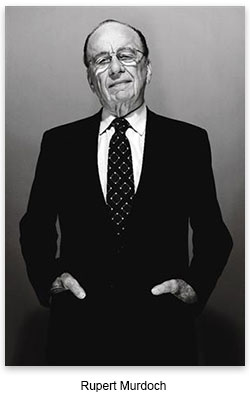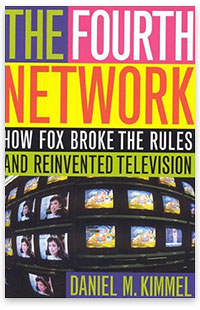 Rupert Murdoch was buying up online properties in the mid 1990s, trying to do with the newly commercial Internet what he had done with FOX television during the previous ten years or so. One of his new acquisitions was a gaming company here in Charlottesville. My friend and I became the two "web guys" for the company. It was my first full-time job in the private sector.
Rupert Murdoch was buying up online properties in the mid 1990s, trying to do with the newly commercial Internet what he had done with FOX television during the previous ten years or so. One of his new acquisitions was a gaming company here in Charlottesville. My friend and I became the two "web guys" for the company. It was my first full-time job in the private sector.
When I was discussing my yet-to-be-submitted laugh-track article with Paul Cantor and I mentioned that it was competition from HBO and FOX that pushed canned laughter into retreat, Professor Cantor recommended the book The Fourth Network: How FOX Broke the Rules and Reinvented Television by Daniel M. Kimmel.
He says it was his main source for this lecture:
"When Is a Network Not a Network?" (It’s a great talk!)
I said, "You know, I used to work for Rupert Murdoch."
"Don’t you realize," Cantor quipped, "at some point EVERYBODY has worked for Rupert Murdoch."
Charlottesville, perhaps like most university towns, is famously left-wing. Rupert Murdoch was infamously right-wing long before FOX News became the unofficial media arm of the Republican Party. So I sensed a definite ambivalence, sometimes defensiveness, among my co-workers about the guy in charge. One thing I remember people saying with great respect, however, was that Rupert Murdoch had built his media empire by paying not what property was worth but rather what it was worth to him.
That struck me as profound at the time.
What they meant was this: Rupert Murdoch didn’t think of a newspaper as just a newspaper, a TV station as just a TV station. He thought about them as nodes in a network he was building. This meant he outbid his competitors who saw these organizations as single units of profit and loss, whereas Murdoch saw them as part of a bigger picture: what would they contribute to the larger plan?
If there was a single turning point in the history of the FOX network, a moment when the Big Three became the Big Four, it occurred in December 1993 with the simple announcement that NFL football was coming to FOX the following season.
One of the NFL’s attorneys recalled,
"What FOX offered us, the league, was the potential of having a bidder who needed the games, wanted the games, and was willing — in a sense — to overpay for them."
Why would a savvy entrepreneur overpay for anything?
As FOX exec Lucie Salhany later recalled,
"When Rupert took over, Rupert was his most phenomenal. ‘I want it, I have a vision, I’m willing to pay for it.’"
The author comments,
As he had with so many other properties, Murdoch had paid more than the market thought it was worth because he saw a greater opportunity there.
What was his vision? It turns out that 70 percent of the NFL’s viewing audience had never watched FOX.
Salhany again:
"So, in the end, it was actually a bargain to acquire the rights to the NFL to promote the rest of [FOX’s] schedule. It was cheaper. If you went out and spent the same amount of money to promote it, it wouldn’t have been as effective."
What strikes me now is not how brilliant Murdoch was as an entrepreneur (although he was and is) but how my game-company colleagues worded their praise for the man — and what it revealed about the people giving the praise:
Rupert Murdoch didn’t pay what something was worth but rather what it was worth to him.
Notice the unstated assumption that there is such a thing as value independent of an individual evaluator, almost as if "worth" is objective, but Murdoch had the genius to see it as subjective.
Only when I started to read economics almost a decade later did I come to understand that all value is subjective. Consumers pay whatever they feel will benefit them more than the next best thing they could have done with that money, whatever seems better than the opportunity forgone. The difference between consumers and entrepreneurs is twofold:
-
Consumers pay for things as direct ends in themselves, goods that will directly satisfy their subjective needs (consumers’ goods); whereas entrepreneurs pay for things as the means toward achieving other ends (capital or producers’ goods).
-
Consumers can make direct price comparisons between, say, a cup of Starbucks coffee and a cup of diner coffee, or between a MacBook and a Windows laptop, but ultimately the comparison isn’t much of a calculation — it remains a subjective preference for the thing purchased over the forgone option; entrepreneurs, however, need to combine the objective data of recent prices for all their factors of production and compare the result to their personal predictions for what people will pay for the final product.
The successful entrepreneur is the better predictor, the more innovative producer, or both.
When my co-workers praised Rupert Murdoch for pricing factors more presciently or using them more innovatively, they were just saying, in essence, that he was a good entrepreneur. Maybe they understood that. Maybe what they meant by "what it’s worth" was what the current market consensus is for this factor’s future earnings, discounted for time, and assuming no innovation.
I certainly didn’t understand that they were merely describing what an entrepreneur does, and admiring Murdoch for doing it so much better than everyone else.
(Cross-posted at InvisibleOrder.com.)

